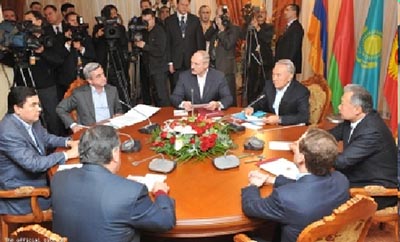KABUL - Defense ministers from the Collective Security Treaty Organization (CSTO) discussed in Bishkek, the capital of Kyrgyzstan, “the possible catastrophe that could happen in Afghanistan after withdrawal of the NATO-led forces,” reports said on Tuesday.
Russian news website Russkaya Planeta (Russian Planet) reported that the Monday’s meeting discussed military threat, intensification of drug trafficking and illegal migration.
Speaking at the meeting, Kyrgyz defense minister and current CSTO chairman, Taalaybek Omuraliyev, said he would seek to raise the CSTO's military potential ahead of the NATO pullout from Afghanistan.
Defense ministers from CSTO member nations signed agreements on joint combat training and a list of military weapons required by the group.
Also on Monday, a meeting of the committee of national security secretaries was also held in Bishkek and its participants discussed issues of regional concern, including cybercime. They also discussed the fight against extremism.
The informal CSTO summit in Bishkek was also attended by Russian President Vladimir Putin, who said he expected urgent issues, such as Afghanistan to be discussed at the gathering.
Kyrgyzstan's presidential office announced earlier on Tuesday that the leaders of Kazakhstan, Kyrgyzstan, Russia, and Tajikistan will discuss the situation in Afghanistan as US-led international forces prepare to withdraw in 2014.
Meanwhile, Russian experts noted that the current situation in Afghanistan is not easy “Americans do not have certain plans on securing the withdrawal of troops from Afghanistan and they do not know what will happen after that,” Vladimir Zharikhin, the deputy director of the Russian Institute of CIS Countries, was quoted as saying by Russkaya Planeta.
According to him, after the withdrawal of NATO-led troops, the situation in Afghanistan will be chaotic and this will affect, first of all, the Central Asian nations bordering on Afghanistan. (Pajhwok)

